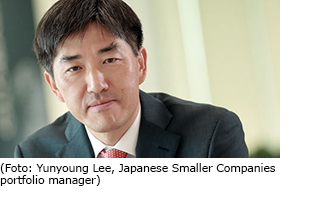
Janus Henderson: Prospects for Japanese smaller companies in 2018
Yunyoung Lee, manager of the Japanese Smaller Companies Strategy, shares his outlook for 2018 including the reasons why he thinks the asset class has the potential to perform well in the year ahead.
19.12.2017 | 08:45 Uhr
 What lessons have you learned from 2017?
What lessons have you learned from 2017?
We did not anticipate the strength of the factory automation and employment services sector this year, which was mainly driven by the current labour shortage in Japan. The underweight positions in these sectors have led them to be the key detractors to our portfolios’ performance this year.
What are the key themes likely to shape the markets in which you invest in 2018 and how is this likely to impact portfolio positioning?
In my view we are likely to see wages (pay levels) continue to rise. Owing to the labour shortage, compensation levels have increased steadily over the last three to five years. The trend may well accelerate from 2018 and we should see a commensurate increase in private consumption. We have positioned our portfolios ahead of this and hope to benefit from the ongoing trend of higher consumer spending.
Where do you currently see the risks within your asset class and where are the most compelling opportunities?
We see the key risks for Japanese equities as being strong yen appreciation and a slowdown in the global economy. Looking ahead to 2018, we believe we will continue to see attractive opportunities in Japanese smaller companies. The focus of our approach is to identify mispricing opportunities through in-depth proprietary fundamental research to discover incremental changes that may impact a company’s growth potential and share price. We look to invest in undervalued smaller companies to benefit from the potential of these companies to become merger and acquisition targets by cash rich larger companies. Additionally, we seek to invest in companies that are improving corporate governance standards and are rewarding shareholders; these characteristics have greatly improved since Prime Minister Abe’s introduction of a corporate governance code in 2015, and look set to be a continuing trend given Abe’s solid victory in the October 2017 snap general election.



Diesen Beitrag teilen: